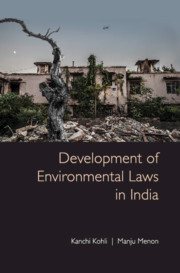Book contents
- Frontmatter
- Contents
- List of Tables
- Preface
- Acknowledgements
- Introduction: Environmental Laws and Development in India
- 1 Fundamentals of Environmental Law
- 2 Institutions Regulating India’s Environment
- 3 Forest Reservation and Conservation
- 4 Pollution Control and Prevention
- 5 Environmental Protection
- 6 Wildlife and Biodiversity Conservation
- 7 Ground and Surface Water Extraction
- 8 Land Acquisition
- 9 Climate Litigation and Policy Frameworks
- 10 Contemporary Environmental Law Reforms
- Index of Laws, Legal Cases and Government and Parliamentary Committee Reports
- General Index
1 - Fundamentals of Environmental Law
Published online by Cambridge University Press: 31 July 2021
- Frontmatter
- Contents
- List of Tables
- Preface
- Acknowledgements
- Introduction: Environmental Laws and Development in India
- 1 Fundamentals of Environmental Law
- 2 Institutions Regulating India’s Environment
- 3 Forest Reservation and Conservation
- 4 Pollution Control and Prevention
- 5 Environmental Protection
- 6 Wildlife and Biodiversity Conservation
- 7 Ground and Surface Water Extraction
- 8 Land Acquisition
- 9 Climate Litigation and Policy Frameworks
- 10 Contemporary Environmental Law Reforms
- Index of Laws, Legal Cases and Government and Parliamentary Committee Reports
- General Index
Summary
This chapter focusses on the fundamental aspects of Indian environmental law. One of the most significant features of Indian environment law is that the right to life enshrined by the Indian Constitution is interpreted as inclusive of the right to a healthy environment. This interpretation evolved in the 1980s and has been used by the Supreme Court and the high courts to adjudicate complicated environmental matters. Another significant feature of Indian en¬vironmental law relates to the provisions of universal legal codes, that is, the Indian Penal Code (IPC), Criminal Procedure Code (CrPC) and Civil Pro¬cedure Code (CPC), on ‘nuisance’. Indian courts have developed a vast body of case law using provisions of nuisance to address pollution, municipal solid waste generation, or obstruction of water and to seek environmental damages. The third aspect relates to international environmental conventions. Indian en¬vironmental laws have been framed to comply with India's commitments to the conventions discussed in this chapter or to advance the objectives of these conventions. Courts and governments have relied on declarations and agree-ments arising out of these conventions to inform and justify their decisions. The fourth aspect is the group of legal concepts and principles that are applied to Indian environmental laws and policies. Indian courts have drawn upon and interpreted the scope of these concepts and principles.
This chapter elaborates these aspects in three sections:
I. Constitutional Right to Life and the Environment
II. Nuisance in the Indian Penal Code, Civil Procedure Code and Code of Criminal Procedure
III. International Conventions, Principles and Concepts of Environmental Law
CONSTITUTIONAL RIGHT TO LIFE AND THE ENVIRONMENT
The Constitution of India guarantees certain fundamental freedoms and rights to all citizens of India. There are a number of constitutional provisions that are central to environmental laws in India. These have been discussed in different chapters in this book. This section discusses in detail Article 21 listed in Part III of the constitution, which is one of the most widely interpreted provisions in Indian environmental law. Article 21 on the right to life states, ‘No person shall be deprived of his life or personal liberty except according to procedure established by law.’
- Type
- Chapter
- Information
- Development of Environmental Laws in India , pp. 30 - 58Publisher: Cambridge University PressPrint publication year: 2021

